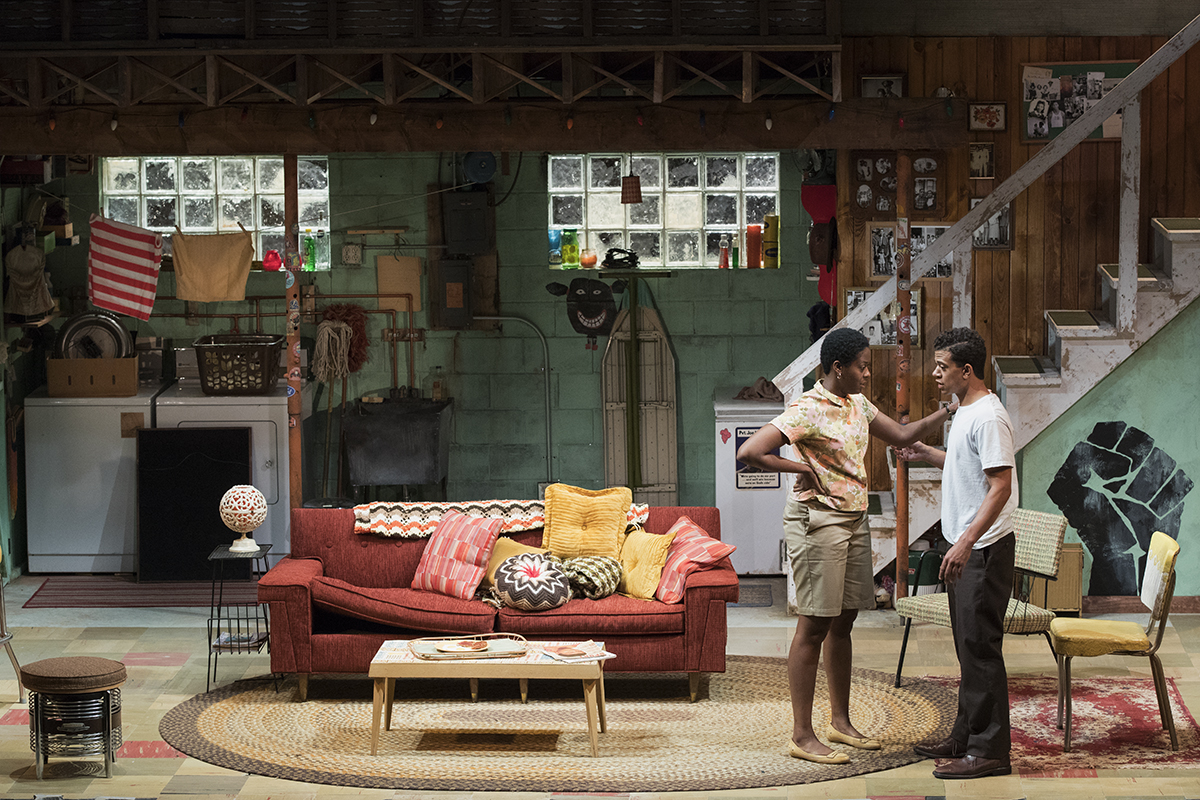Nervous and suspicious, two black men carry the covered body of an unconscious white woman down the stairs of a dark Detroit basement. They step gingerly so as not to bump their heads or drop their quarry.
It’s the kind of scene that’s sure to ratchet up the fear factor in TV crime dramas, often attended by sirens and gunshots. But the provocative sequence takes place not onscreen but onstage in Detroit ’67, playwright Dominique Morisseau’s poetic exploration of dreams and budding love against a backdrop of urban unrest. And the scene, like the play itself, upends both expectations and stereotypes.
Detroit ’67 opened over the weekend in Steve H. Broadnax III’s affecting and absorbing production at Chautauqua Theater Company, nearly 50 years to the day of the July 23, 1967, riots that set Morisseau’s hometown alight.
The action, set in the lead-up to those historical events, revolves around two siblings, Chelle (Moses Ingram) and Lank (Micah Peoples), who are dealing with an inheritance from their parents even as they make ends meet by hosting house parties. Lank wants to go legit and to use his part of the inheritance to open a bar with his friend Sly (Andy Lucien). Chelle wants to go legit as well, but questions if selling liquor is the way to honor their parents.
The play also involves Chelle’s friend, Bunny (Stori Ayers), who provides comic relief, and Caroline (Jennifer Apple), the mystery woman conveyed down the stairs.
Director Broadnax grounds the play squarely in history, expanding Michael Carnahan’s single and evocative set with a variety of multimedia tools, including videos and radio broadcasts (Katherine Freer designed the projections).
But the production stands out because of its sterling cast, which savors the language and honors Morisseau’s genius, as well as the music (Curtis Craig designed the sound, which includes a liberal offering of Motown soul by the likes of The Temptations, Martha Reeves and the Vandellas, The Four Tops, among others).

True, Broadnax’s choices are a touch broad in couple of places, including Lank’s overwrought tumbling down the stairs and another bit in which Lank and Bunny dance erotically a tad too long. But those are relative nits in an otherwise lyrical production with strong performances.
Ingram’s Chelle is beautifully inviting and open. Honest, sweet and full of motherly wit, she shows us her heart and world, allowing us to cheer her on. And when she dances at the end of the show, a solo turn that veers between crying and celebration, we feel every bit of her bittersweet joy.
Ingram is surrounded by equal talent. In fact, her Chelle and Lucien’s Sly flirt with each other throughout the show. The two actors play a romantic scene in which Sly uses Chelle’s words to seduce her, like a master class in seduction.
Lucien, too, delivers a performance with inviting, ordinary majesty. It is that nobility that makes his fate so heartbreaking.
Ayers’ Bunny is a flirty woman of big appetites and lots of loving. Her interactions with Lank are something of a physical mismatch, but the humor is not at the expense of their characters or either actor. And their romantic joshing is tinged with sweetness.
Peoples’ Lank is something of an innocent. It is he, and Lucien’s Sly, who carry an unconscious woman down the stairs, with all that implies about their wisdom, or lack thereof, and their hearts. His character may not be as deep as, say, Chelle or his sparring partner Sly, but the actor shows us his goodness.
Apple, who plays the carried woman, maintains an air of mystery throughout the show, stringing us along as we try to figure her out. But questions linger, those about her and those spurred by the play itself.
Morisseau uses a historical crucible to talk about our progress. In fact, one of the leitmotifs of Detroit ’67 involves a broken record-player, the same one that stops the sweet songs of Motown as Chelle grooves while doing chores. The metaphor suggests that 50 years on and with reports of police brutality and unrest it draws in cities big and small, we may not have moved too far away from that fiery past.
Rohan Preston has been a theater critic for The Star Tribune in Minneapolis since 1998 and has served on the Pulitzer Prize jury for drama. He can be reached at rpreston@startribune.com.





